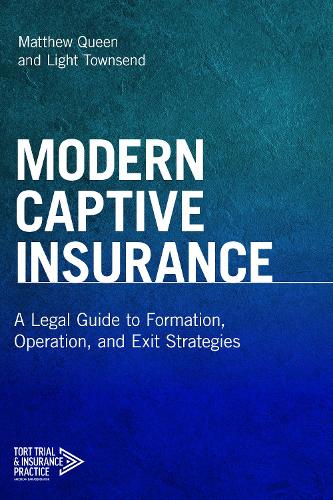
Modern Captive Insurance: A Legal Guide to Formation, Operation, and Exit Strategies
(Paperback)
Publishing Details
Modern Captive Insurance: A Legal Guide to Formation, Operation, and Exit Strategies
By (Author) Matthew Queen
By (author) Light Townsend
American Bar Association
American Bar Association
12th February 2021
United States
Classifications
General
Non Fiction
346.73086
Physical Properties
Paperback
304
Width 152mm, Height 228mm
Description
Insurance is a sophisticated financial vehicle that can be best understood through the lens of risk management. Experiencing dramatic growth, captive insurance is owned and controlled by its insureds, pooling the risks of its owners. Captive insurance provides businesses with unmatched flexibility regarding coverage, claims, premium, and control, while also offering advantages such as lucrative dividends and innovative financing techniques.
This state-of-the-art guide traces the development of small captive insurance and addresses how to set up and properly manage a captive. Modern Captive Insurance: A Legal Guide to Formation, Operation, and Exit Strategies, begins with an overview of what captive insurance is and detail the advantages in setting up a captive for a range of different business situations. Chapters explain how to incorporate and start up a new captive insurance program, including basic terminology and the roles different professionals play in running captive programs.
Captive insurance is an intricate yet effective risk management strategy. For guidance in properly establishing a captive, the authors address critical issues evaluated by the IRS, such as risk shifting and distribution, and explore ethical considerations arising out of off-shore captive management, such as how to identify money laundering red flags and how to properly manage the investments of reserves.
Modern Captive Insurance takes an in-depth look at the topics and issues that are common in insurance and in businesses, but are often handled differently for captives, such as:
- Financial statements, investments, and financial ratings
- Policy drafting and coverage
- Risk pools and structuring the pooling arrangement to be valid
- Federal, state and local taxation
- Tax-exempt organizations
- Risk retention groups (RRP)
- Reinsurance, and more
Table of Contents
Chapter 1: Captive Company Formation
Chapter 2: Captives and Capitalists
Chapter 3: Risk Pools
Chapter 4: Financial Statements, Investments, and Financial Ratings
Chapter 5: Policy Drafting and Coverage
Chapter 6: Underwriting and Claims Reserving
Chapter 7: Federal Income Tax and Captives
Chapter 8: State and Local Captive Insurance Issues
Chapter 9: Tax-Exempt Organizations and Captive Insurance
Chapter 10: Risk Retention Groups and How They Work
Chapter 11: Reinsurance
Chapter 12: Workers' Compensation and the Grand Bargain
Chapter 13: Employee Benefits
Conclusion
Table of Cases and Index
Author Bio
Matthew Queen serves as General Counsel for Venture Captive Management, LLC, and is a regular speaker at domestic and international captive insurance and alternative risk financing conferences. He consults with middle market CEOs and business owners regarding taxation, risk financing, insurance defense litigation, and international business transactions. His practice focuses on corporate regulatory and transactional matters for a variety of captive insurance companies and risk retention groups. In addition to this treatise, Matthew has authored several technical articles exploring applications of captive insurance to emerging markets and navigating captive insurance companies through changes to the tax code. A band nerd at heart (trombone), Matthew graduated from the Georgia Institute of Technology with a Bachelor of Science in Business Management and then completed his Juris Doctorate and Masters of Taxation at Georgia State University. He is happily married and enjoys Olympic weightlifting as well as hiking through the Georgia mountains. Light Townsend is an attorney with the firm Drummond Wehle Yonge, LLP, in Tampa, Florida. Lights clients include small to medium-sized businesses and the individuals who own and run them. He focuses his practice on assisting these clients in understanding and complying with complex federal tax planning, particularly as it relates to estate planning, business planning, succession planning, wealth preservation, risk management, and asset protection. In addition to his work on this treatise, Light is an active member in the Florida Bar Tax Section, helping to write technical advice memoranda and comments regarding changes in the tax code. As a graduate research assistant for Philip Postlewaite, Light edited the eighth edition of Professor Postlewaites West-published treatise Partnership Taxation. Light received his LLM in Taxation with Honors from Northwestern University Pritzker College of Law, his Juris Doctorate from Florida State University, and his Bachelor of Science from Auburn University. He enjoys fishing, cooking, and playing the guitar in his free time.
